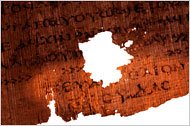Much Ado About Nothing (The Gospel of Judas)
 It's been all over the news... The Gospel of Judas has been discovered. This 2nd century Coptic translation of a Greek document that was supposed to have existed a century earlier is alledged to contain "insights into the relationship of Jesus and the disciple who betrayed him."
It's been all over the news... The Gospel of Judas has been discovered. This 2nd century Coptic translation of a Greek document that was supposed to have existed a century earlier is alledged to contain "insights into the relationship of Jesus and the disciple who betrayed him."According to the New York Times:
The most revealing passages in the Judas manuscript begins, "The secret account of the revelation that Jesus spoke in conversation with Judas Iscariot during a week, three days before he celebrated Passover."
The account goes on to relate that Jesus refers to the other disciples, telling Judas "you will exceed all of them. For you will sacrifice the man that clothes me." By that, scholars familiar with Gnostic thinking said, Jesus meant that by helping him get rid of his physical flesh, Judas will act to liberate the true spiritual self or divine being within Jesus.
Unlike the accounts in the New Testament Gospels of Matthew, Mark, Luke and John, the anonymous author of the Gospel of Judas believed that Judas Iscariot alone among the 12 disciples understood the meaning of Jesus' teachings and acceded to his will. In the diversity of early Christian thought, a group known as Gnostics believed in a secret knowledge of how people could escape the prisons of their material bodies and return to the spiritual realm from which they came.
Well, at least the Times got part of it right. The Gospel of Judas is nothing more than a little 1st or 2nd century heresy called Gnosticism.
The Gnostic movement arose among early Christians and was rightly seen as being inconsistent with the revelation of God found in both the Old Testament and in Jesus Himself.
The term, gnostic, comes from the Greek word, gnosis, meaning knowledge. Gnostics said that Jesus gave certain secret knowledge to various people - who differed from one gnostic group to another. This secret knowledge, it was taught, gave those who learned it special insight or special wisdom not possessed by others.
If you want more really great information about Gnosticism, check out Better Living's post on the subject.












1 Comments:
I wathced a 2 hour special on this document on NGC last night. It should be replaying for awhile, so TIVO it. It was extremely interesting the path this document took, from trading on the black market, to finding its way to the University of AZ physics dept for Carbon dating. They concluded it was from 280-330 AD. Of course I don't belive in the truth of this document, it was very interesting. NGC's position was that it is not supposed to be included with our Christianity, but shows more in detail the early gnostic beliefs.
April 10, 2006 8:15 AM
Post a Comment
<< Home